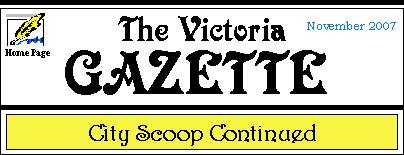|
VICTORIA IS PRO-GROWTH
BUT NOT FOR MANDATORY HIGH DENSITIES
Council voted unanimously on Octo-ber 11th to "authorize and empower" the city's Comprehensive Plan Task Force to consider and identify all of the concerns and issues of the City of Victoria as it provides feedback to AMM and the Metropolitan Council regarding the city's density in housing and the city's compre-hensive plan for 2020-2030.
The AMM (Association of Metropol-itan Municipalities), also known as "Metro Cities," is a service and lobbying organization for cities in the seven-county metro area. Its function is to represent metro city interests before the Metro-politan Council.
The Metropolitan Council, which is the actual planning organization for the seven-county metro area, runs the regional bus and light rail transit, collects and treats wastewater, manages water resour-ces, plans regional parks, and administers funds that provide housing opportunities for low and moderate income people. The Met Council is appointed and serves at the pleasure of the Minnesota Governor.
The City of Victoria is not happy with growth guidelines being dictated by the Metropolitan Council. For one thing, they want to require a minimum housing density of 3 units per acre in order for cities to get "credits" in planning for future growth.
According to a letter drafted by Holly Kreft, Victoria's Director of Planning, the guidelines "do not take into consideration a community's unique topographic fea-tures ... and a one-size-fits-all approach is not conducive to how we want our com-munity to grow."
Stated Victoria Councilmember Jim Paulsen, "I think we're at a time now with the Comprehensive Plan where we'll have to do some heavy lifting ... I say let's let the Comprehensive Plan Task Force do what's best for Victoria. I think the Task Force should represent Victoria and no-body else."
Victoria's Comprehensive Plan Task Force includes Richard Tieden and Kim Roden from the City Council; Tom Vogt and Jim Donadio from the Planning Com-mission; Terry Hartman from the Busi-ness Development Committee; Linda McNulty from the Senior Commission; Dan Barsness, Daryl Anderson, Michelle Aspelin, Mike Shouldice, Tom Kreykes, and Paul Klutes as at-large members;
Mary Erickson from School District 112; Ken Essig from Laketown Township.
Continued Councilmember Paulsen, "Victoria has natural land issues and traffic concerns. If we put forward a plan that we think reasonable for Victoria, it gives us opportunity to negotiate for Vic-toria."
"I'm proposing that we think and we study," said Jim. "We have some pre-cious assets to protect. Maybe they [the Met Council] can help us protect our assets and we can help with their densi-ties."
The Met Council is interested in higher densities in order to maximize the use of its existing sewer systems, for example, before extending costly sewer lines to outlying areas.
"I'm proposing that the Comprehen-sive Plan Task Force bring us the best plan for Victoria," said Jim.
Agreed Councilmember Tim Amund-sen, "We are not anti-growth. We want to reserve the right to grow responsibly. At three units per acre, we could not sustain the traffic we even have today. It's ludi-crous. A cookie-cutter approach is not responsible. I've got my doubts that the sewer and transportation boards are okay with this. I'd like to see what the Sierra and Audubon Clubs have to say about this."
Said Councilmember Paulsen, "The best communities [neighborhoods] in our city could not be replicated under this document."
Agreed Councilmember Kim Roden about the density guidelines, "It is a huge departure from the past." Victoria has been operating with an average density of 2.4 units per acre. Jumping to 3 units per acre means practically a 20% increase in densities.
Victoria's thoughts and information regarding mandatory high densities will also be forwarded to State Representative Paul Kohls, Senator Julianne Ortman, as well as Carver County Commissioner Randy Maluchnik.
***
On October 25th Councilmember Jim Paulsen asked, "Why does density take such high priority when we face so many other issues?" He pointed out that the issues of density and transportation collide; the Met Council wants increased density but transportation [roads] can barely handle current density.
Stated Councilmember Kim Roden, "Transportation in the state is broken."
Stated Mayor Mary Thun, "I'm really tired of this taxation without representa-tion." She was referring to the fact that for the last 18 months, ever since Julius Smith resigned his seat, Victoria has had no representation on the Met Council.
City Administrator Steve Sarvi will pursue communication with Peter Bell, top dog at the Met Council, and also Governor Pawlenty. Stated Councilmem-ber Paulsen, "We want them to know that we are trying to work within the system. Invite Peter Bell to come and see our re-sources."
Click here for more City Scoop.
|
|





